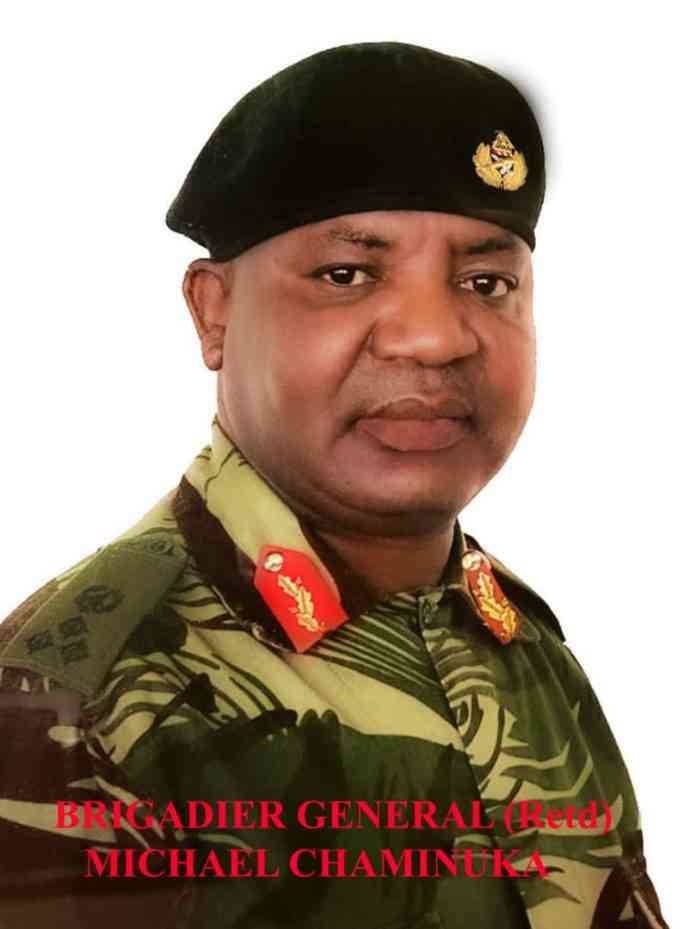
I do not often write about events that happened in the past.
However, the passing on of Brigadier General Michael Chaminuka has moved me to write and salute one of the finest soldiers and liberators this country has ever produced.
Humble, grounded and smart, I first met then Captain Michael Chaminuka at Special Task Force in Chimoio, Mozambique, in 1990.
At that time, Zimbabwe had deployed security forces in Mozambique to safeguard the pipeline and assist the Frelimo government to restore peace, law and order in Mozambique.
The Renamo insurrection was at its peak and Zimbabwe was heavily involved in the fight on the side of Frelimo and the government of Mozambique. Captain Chaminuka, was the military intelligence officer of 5 Brigade.
The commander was Colonel Elisha Musonzini. Together with my senior colleague Katsiru, we were deployed in Chimoio and worked together with the Zimbabwe National Army in providing intelligence.
As the youngest in the intelligence circle, I struck a strong relationship with Captain Chaminuka and Kamusoko who was the brigade medical officer. We would spend numerous days travelling together and gathering intelligence, analysing and processing information gleaned from various sources.
Ours was to ensure we provided timeous intelligence to the command element so that they could make prompt decisions.
- Tribute to gallant fighter
Keep Reading
Chaminuka struck me as a dedicated officer and disciplined war veteran. He had gone through the officer cadet training and was highly trained in intelligence. During our tour of duty in Mozambique, a cable came from National Joint Operations Command headquarters in Harare tasking us to go and interview Renamo bandits who had been captured and detained at Nhamatanda, Sofala province. A number of our troops had been ambushed and killed in the area between Nhamatanda and Lamego.
The battalion leadership led by then Lieutenant Colonel Nicholas Dube, a decorated commando trooper, was baffled and frustrated. A crack team was then assembled to assist the military leadership. General Chaminuka and I drove down to Lamego and we were received by Lt Col Dube and his senior command element, who gave us detailed briefing on what was obtaining in his area of tactical responsibility. He was deeply concerned about the volatile situation.
The two of us immediately got to work and began our task early in the morning the following day. We were accompanied by the battalion intelligence team to Nhamatanda prison to interview the captured bandits. We drove in a CIO-issued B2200 to the main camp at Nhamatanda. After disembarking and identifying ourselves, the security details accompanied us to the holding cells. The prisoners were standing in an open pit prison in water which was slightly above the hip.
These were the conditions the captured bandits lived in.
To get into the prison, we had to walk down a spiral staircase into the water-logged cells. As we started inquiring and interviewing the captured bandits, I overheard remarks made in Portuguese that immediately concerned me.
I had acquired a working knowledge of Portuguese and could understand the language. The officers from our sister institutions who had accompanied us to the cell murmured something to the effect that we, Zimbabweans, were now their problem and they should deal with us.
The insinuation was that we should be attacked while inside the prison. I immediately alerted Chaminuka and my colleagues to the danger we faced and told them to draw their guns and get out of the place.
Armed with our pistols, we made our way out of the building, got into our vehicle and drove to the battalion camp at Lamego. We were shaken but not deterred, for we knew it was a war and anything was possible. We briefed the Commanding Officer Lieutenant Colonel Dube, on what had transpired.
In our report to the National Joint Operations Command, we highlighted our observations, that the war had taken a dramatic turn and that the Renamo bandits had been able to get the people on their side and had infiltrated most of the institutions in that area.
The attacks on our troops and vital infrastructure was being carried out by bandits who were operating from within the various settlements along the corridor. We observed that it was no longer attacks coming from bases located far away, but that the communities were hosting the bandits. We strongly recommended to the leadership that the war effort required a review. We opined that the war was now a quagmire and would not be winnable.
Meanwhile our colleagues in Beira, Captain Josto (Defence Attache), Jeff Mbalekwa, Kufa Chinoza and Tadzingaira Tachiveyi were also of the same opinion. Fast forward, the peace process got underway and elections were held under the supervision of the United Nations, led by Aldo Ajello. The complete sweep by Renamo of the Sofala province and in particular, the Nhamatanda area proved our point that the bandit movement was enjoying unequal support from the community.
I chose to dwell on this one incident to confirm the commitment and determination Chaminuka had for his country.
He was a professional soldier and dedicated patriot. Fair and balanced, he was a remarkable officer and gentleman.
We continued to work together after he was appointed to higher offices. In all our interactions, it was evident, Chaminuka was a caring big brother. Our two daughters Natasha Kasukuwere and Rachelle Chaminuka studied law together at the University of Zimbabwe and become great friends.
We last met, when both girls were registered as legal practitioners at the High Court of Zimbabwe in 2018. Chaminuka was not only a comrade-in-arms but also a brother and patriotic warrior for the motherland. Mukoma, Bvumavaranda, famba zvakanaka, I will not be able to attend your burial, but I will plant flowers on your burial ground in good time.
Farewell great commander.









